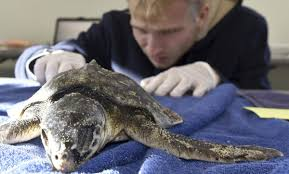Temperatures Dropping Leads to a High Amount of Frozen Sea Turtles

(Cover Photo Source: Fredericksburg.com)
December 4, 2018
Hundreds of sea turtles have been found frozen and washed ashore along the coast of Cape Cod this past week.
Although this is something that happens every winter, the number of frozen turtles has fluctuated greatly from past years to this year. In an interview with CNN, Bob Prescott, Mass Audubon Director, states, “Mass Audubon, the largest nature conservation nonprofit in Massachusetts, regularly patrols the beaches this time of year looking for cold-stunned turtles. But this was many more than I expected.”
So far around 219 turtles have been rescued from the shores of Cape Cod, and on Thanksgiving alone 82 turtles were rescued, but sadly 81 of the 82 turtles have died. Prescott says that “It was like they were flash-frozen, flippers in all weird positions like they were swimming” (Cape Cod Times).
An article from USA Today explains what has been happening to the sea turtles. It states, “The organization said endangered sea turtles end up trapped because of the cape’s hook-shaped geography. As a result, they are ‘cold-stunned,’ as their systems shut down when their body temperature drops along with the temperature inside the water.”
The reason for the high number of flash-frozen turtles is because of the high drop in temperature that occurred last week. In certain parts of Cape Cod it was down to at least 19 degrees Fahrenheit, but the high powered winds it made the temperature feel like four degrees Fahrenheit.
The type of turtles that have been mainly found frozen are juvenile Kemp’s ridley, the smallest sea turtle species. Sadly, this species is endangered as well.
Also, at least 500 sea turtles have been rescued this fall, and Prescott thinks that the numbers, “May reach 1,000 before the stranding season ends around Christmas” (Cape Cod Times).
With the rescue team alert and hopes for a more gradual cool down of temperature, there may be prospects that these turtles will become less affected by the cold for the rest of this winter season.










